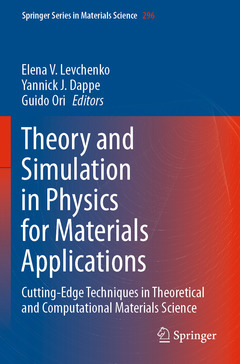Description
Theory and Simulation in Physics for Materials Applications, 1st ed. 2020
Cutting-Edge Techniques in Theoretical and Computational Materials Science
Springer Series in Materials Science Series, Vol. 296
Coordinators: Levchenko Elena V., Dappe Yannick J., Ori Guido
Language: English
Subject for Theory and Simulation in Physics for Materials Applications:
Keywords
Computational Materials Science; Nanoparticle and Nanostructured Materials; Graphene and 2D Materials; Properties of Chalcogels; Elastic Properties of Materials; Modelling Electrochemical Processes; Diffusion in Liquid Alloys; Band Structure Engineering in Half-Heuslers; Interfaces in Low-Dimensional Systems; Design of Biointerfaces; Materials simulation
Publication date: 02-2021
Support: Print on demand
Publication date: 02-2020
286 p. · 15.5x23.5 cm · Hardback
Description
/li>Contents
/li>Biography
/li>Comment
/li>
This book provides a unique and comprehensive overview of the latest advances, challenges and accomplishments in the rapidly growing field of theoretical and computational materials science. Today, an increasing number of industrial communities rely more and more on advanced atomic-scale methods to obtain reliable predictions of materials properties, complement qualitative experimental analyses and circumvent experimental difficulties. The book examines some of the latest and most advanced simulation techniques currently available, as well as up-to-date theoretical approaches adopted by a selected panel of twelve international research teams. It covers a wide range of novel and advanced materials, exploring their structural, elastic, optical, mass and electronic transport properties. The cutting-edge techniques presented appeal to physicists, applied mathematicians and engineers interested in advanced simulation methods in materials science. The book can also be used as additional literature for undergraduate and postgraduate students with majors in physics, chemistry, applied mathematics and engineering.
Development of Advanced Simulation Methods: The Predictive Power.- Making Computer Materials Real: The Predictive Power of First-Principles Molecular Dynamics.- Assessing The Versatility of Molecular Modelling as a Strategy for Predicting Gas Adsorption Properties of Chalcogels.- Modelling Electrochemical Processes and Defects in Semiconductor Materials Through Constant Fermi Level Ab Initio Molecular Dynamics.- Controlling the Complexity of First Principles Simulations of Materials via Large Scale Wavelet-Based Density Functional Theory.- Elastic Properties of Materials.- Amorphous Sn-Ti Oxides: New Insights from Self-Consistent Hybrid Functional Calculations.- Recent Advances in Molecular Dynamics and Monte Carlo Simulations of Transport Properties of Materials.- Diffusion Kinetics and Binary Liquid Alloys with Demixing Tendency: Case Study on Cu-Ag Melts.- Kinetic and Thermodynamic Contributions into Interdiffusion in Ni-Zr Melts Assessed by Atomistic Simulations.- Advanced MonteCarlo Simulations for Ion Channeling Analysis of Defects In Crystals.- Recent Progress in Electronic Transport and Device Simulation, Optical Properties.- Electronic and Optical Properties of Polypyrrole as Toxic Gas Sensor.- Bandstructure Engineering in Half-Heuslers to Improve their Thermoelectric Power Factor.- Modelling the Coulomb Blockade Effect in the Metal-Insulator-Semiconductor Tunnel Diode.- Surfaces, Interfaces in Low-Dimensional Systems.- Investigation of Electronic Properties in Graphene - Hexagonal Boron Nitride Nanoflakes by Machine Learning Techniques.- Hydrogen in Silicon: Evidence of Multiple Independent States.- Rational Design of Biointerfaces: A Computational Approach.
These books may interest you

Simulations in Nanobiotechnology 71.13 €



